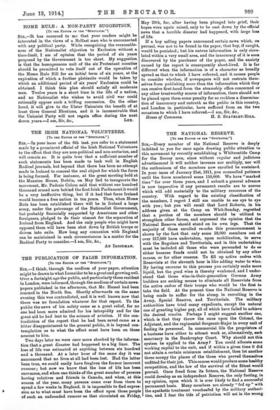THE PUBLICATION OF FALSE INFORMATION. [To sus Emma or ras
..Sesc-rems.“] SIR,—I think, through the medium of your paper, attention might be drawn to what I consider to be a great and growing evil. Over a fortnight ago the public, and particularly those resident in London, were informed, through the medium of certain news- papers published in the afternoon, that Mr. Hamel had been rescued in the North Sea. Shortly afterwards on the same evening this was contradicted, and it is well known now that there was no foundation whatever for that report. To the public the news of his safety came as a great relief, for no one had been more admired for his intrepidity and for the great aid he had lent to the science of aviation. If the con- tradiction of the report that he had been saved came as a bitter disappointment to the general public, it is beyond con- templation as to what the effect must have been on those nearest to him.
Two days later we were once more shocked by the informa- tion that a great disaster had happened to a big liner. The loss of life was estimated at anything between six hundred and a thousand. At a later hour of the same day it was announced that no lives at all had been lost. Had the latter been true, we could easily have forgiven the former incorrect rumour ; but now we know that the loss of life has been enormous, and when one thinks of the great number of persons having relatives and friends in Canada, and when, at this season of the year, many persons come over from there to spend a few weeks in England, it is impossible to find expres- sion as to what must have been the effect upon those people of such an unfounded rumour as that circulated on Friday, May 29th, for, after having been plunged into grief, their hopes were again raised, only to be cast down by the official news that a terrible disaster had happened, with large loss of life.
If a boy selling papers announced certain news which, on perusal, was not to be found in the paper, that boy, if caught., would be punished ; hut his untrue information is only circu- lated within a very small area, and the inaccuracy of it is soon discovered by the purchaser of the paper, and the anxiety caused by the report is consequently short-lived. It is far different when the information is of a character so broadly spread as that to which I have referred, and it causes people to consider whether, if newspapers will not restrain them- selves from publishing more than the information which they can receive first-hand from the steamship office concerned or any other trustworthy source of information, there should not be placed upon them some penalty for so reckless a dissemina- tion of inaccuracy and untruth as the public in this country, and London in particular, have suffered from on the two occasions to which I have referred.—I am, Sir, &c.,










































 Previous page
Previous page